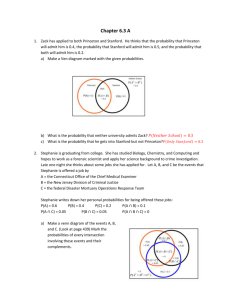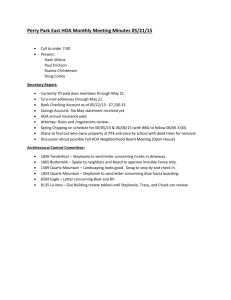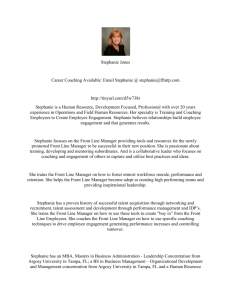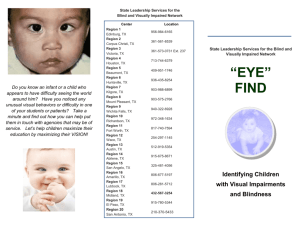INSIGHTS Volume 36 | Summer 2013
advertisement
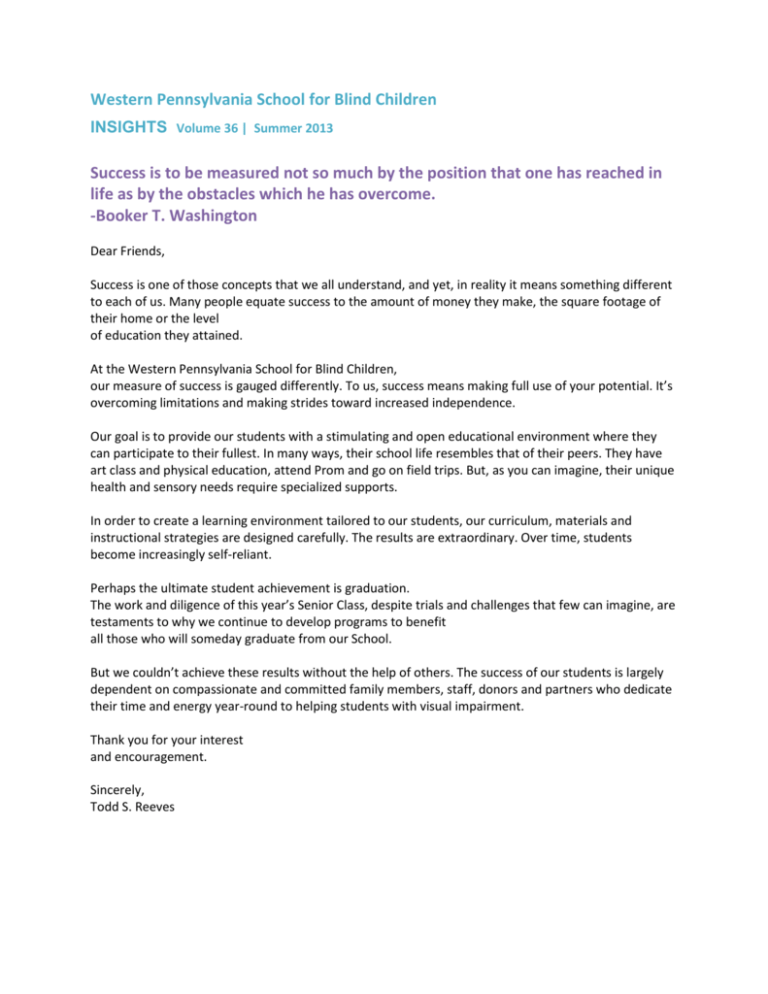
Western Pennsylvania School for Blind Children INSIGHTS Volume 36 | Summer 2013 Success is to be measured not so much by the position that one has reached in life as by the obstacles which he has overcome. -Booker T. Washington Dear Friends, Success is one of those concepts that we all understand, and yet, in reality it means something different to each of us. Many people equate success to the amount of money they make, the square footage of their home or the level of education they attained. At the Western Pennsylvania School for Blind Children, our measure of success is gauged differently. To us, success means making full use of your potential. It’s overcoming limitations and making strides toward increased independence. Our goal is to provide our students with a stimulating and open educational environment where they can participate to their fullest. In many ways, their school life resembles that of their peers. They have art class and physical education, attend Prom and go on field trips. But, as you can imagine, their unique health and sensory needs require specialized supports. In order to create a learning environment tailored to our students, our curriculum, materials and instructional strategies are designed carefully. The results are extraordinary. Over time, students become increasingly self-reliant. Perhaps the ultimate student achievement is graduation. The work and diligence of this year’s Senior Class, despite trials and challenges that few can imagine, are testaments to why we continue to develop programs to benefit all those who will someday graduate from our School. But we couldn’t achieve these results without the help of others. The success of our students is largely dependent on compassionate and committed family members, staff, donors and partners who dedicate their time and energy year-round to helping students with visual impairment. Thank you for your interest and encouragement. Sincerely, Todd S. Reeves Recipe for Success: Comprehensive Nutritional Services As any parent can attest, persuading a child to eat their meal can sometimes require a herculean effort. Notoriously picky eaters, kids need a well-balanced diet to have enough energy to learn, play and grow. But for students with special needs, like those who attend the Western Pennsylvania School for Blind Children (WPSBC), mealtime can be exponentially challenging. In addition to their visual impairment, our enrolled students have other complex medical and sensory conditions that can affect their ability to maintain a healthy diet. Some kids can’t swallow normally or have restricted movements that make even lifting a fork to their mouth difficult. Others have allergies, require feeding tubes or take medications that interact with food. Many of our students who need a wheelchair for mobility don’t burn enough calories and gain weight easily; while some can’t seem to consume enough calories to maintain their weight. The considerations, adaptations and modifications necessary to safely feed all of our students can seem endless. Mealtime is a collaborative, behind-the-scenes effort that includes goal setting, data tracking and support services that are meticulously planned and supervised by a multi-disciplinary team of educational, therapeutic, healthcare and dietary professionals. Overseeing this intricately orchestrated process, the School’s Dietary Department staff serves up to three customized meals and two snacks daily for nearly 180 enrolled students. Not only must they adhere to strict federal and state guidelines, but they further tailor meals to address our unique youngsters’ needs, preferences and restrictions. Take for example, Early Childhood Department student Evan Foster. In some ways he’s just like any other eight-year-old boy. He’d rather be playing or riding his adapted tricycle than sitting down to eat. But, in addition to being visually impaired, Evan has cerebral palsy which affects his oral motor skills and muscle tone. His condition results in him burning more calories than his typically developing peers and he is unable to coordinate the thirty muscles and eight cranial nerves necessary to chew and swallow safely. Evan’s personalized meal tray consists of pureed food freshly prepared on-site and thickened juice because the consistency is easier for him to manage and consume. He gets pudding, extra butter and sauces to add preferred taste and calories to each mouthful since he struggles with maintaining a healthy weight. “Eating is by far the biggest challenge of Evan’s day,” explains his Instructor Kathy Buclous. “We have to be creative and find ways to ensure he gets the energy he needs to thrive.” Attention to detail is critical. Led by Chef John Coglio, dietary staff further tailors each child’s tray with adapted utensils, plates, bowls and cups if necessary. Positioning practices, behavioral supports, communication considerations and visual needs are also incorporated into feeding strategies by our staff members. Student Meal Planner Cindy Howcroft has worked at the School for 28 years and has the task of ensuring that each tray is assembled correctly. Her experience and dedication is evident as she can recite students’ mealtime specifications most of the time from memory. “Out of our 178 students, only five have identical trays,” she notes. Managing nutritional services for children with complex medical needs requires strict and thorough organization to ensure accuracy. An online mealtime plan system developed by school technology personnel, occupational therapists, speech language pathologists, nurses and dietary staff, houses the hundreds of details incorporated into students’ feeding plans. The system generates tray cards outlining student specifications that dietary staff members refer to when assembling trays. Creating a mealtime recipe for success is a goal for all our students. For some kids, like Evan, the goal is focused on ensuring proper nutrition. For others, educational objectives such as self-feeding skills, appropriate social behavior or expanding to new foods or textures might be among their goals. But keeping our students safe and ensuring they are in the best condition possible to learn is always an overarching priority. Food for Thought: An Educational Approach for Mealtime Working together, the members of our students’ educational teams provide unparalleled support and instruction for our special boys and girls. Educational teams consist of a certified teacher of the visually impaired, occupational therapist, physical therapist, speech and language pathologist, orientation and mobility instructor, behavior support specialist, nurse and para-educators. Following what is referred to as an “integrated service delivery model,” students’ therapies are incorporated into their everyday school activities. Stop by the dining rooms at lunch and you will observe not just mealtime but an opportunity for a physical therapist to help a student improve his balance when sitting in a chair while an occupational therapist assists another child learning to use a fork. What some of our Team Members are looking for during mealtime Occupational Therapist: Looks at student’s positioning, recommends adapted utensils and focuses on fine motor skill development. Speech Language Pathologist: Evaluates how a student manages the food in their mouth to encourage safe swallowing practices. Teacher of the Visually Impaired: Assesses student’s ability to visually locate food and utensils and if necessary, suggests adaptations. School Nutritionist: Reviews overall health content of the menu according the National School Lunch Program and provides individual consultations for students and their families. Behavior Specialists: Promotes appropriate meal-time manners and discourages disruptive behaviors. Congratulations to the Western Pennsylvania School for Blind Children Class of 2013 Congratulations to the six young men and women comprising the graduating class of 2013. During the annual Senior Recognition Ceremony, family members and friends will gather to witness this important milestone achieved through the hard work of our graduates. Afterwards, graduates, families and staff will celebrate and bid their fond farewells at a graduation reception. Jarod Sampson-DuFour Son of Mr. and Mrs. George DuFour of Mt. Lebanon, Pennsylvania – Allegheny County With his infectious smile and hardy laugh, Jarod’s staff members are quick to note his cooperative spirit and stylish wardrobe. He enjoys getting his hands dirty during horticulture therapy, field trips, listening to music and lunchtime. Jarod has excelled at learning to express his needs and preferences, social interaction with his peers and using his switch to deliver messages. While at School, he kept busy delivering the newspapers and keeping his classroom’s hygiene bins stocked with supplies. After graduation, Jarod will continue attending McGuire Memorial’s adult day training and residential programs. Megan Evans Daughter of Ms. Kristin Petronsky and Mr. Chad Evans of Pittsburgh, Pennsylvania – Allegheny County Independent, caring and happy are words used by staff members to describe Megan. She has excelled in her braille literacy and has mastered the computer keyboard which she enjoys using to send emails to friends and family. On campus, Megan contributes widely to the School community by working at the Lion’s Den as a cashier and at Lavi’s Print and Copy Shop. Her favorite recreational activities include bowling, swimming and baking special treats in the Student Apartment. After graduation, Megan will continue to attend the Blind and Vision Rehabilitation Services-Employment Transition Services program, and either live in a community home, or at home with her family. Stephanie Read Daughter of Mr. and Mrs. Robert Read of Harrison City, Pennsylvania – Westmoreland County With her always pleasant demeanor, Stephanie made great progress this year using her switch to operate her communication device and strengthening her muscles while working in her stander. Some of her favorite pastimes include playing games with friends, talking about her loving family, attending the Creative Arts concerts and aquatic therapy. She often helped out her classmates by picking out library books, stocking supplies and delivering daily messages. After graduation, Stephanie will attend the Learning Adventures for the Visually Impaired program at WPSBC, and either live in an Intermediate Care Facility, or at home with her family. Rebecca Weaver Daughter of Ms. Jean Shearer and Mr. Richard Weaver of Washington, Pennsylvania – Washington County Described by staff members as energetic and hardworking, Rebecca is known for her great sense of humor and beautiful smile. She enjoys social time and playing games with her friends. Her many oncampus jobs include delivering linens and snacks, shredding paper and picking up classroom supplies. Always on the move, Rebecca stays active by riding the adapted tricycle and swimming during aquatic therapy. She has worked very hard this school year increasing her vocational tasks and improving her vocabulary. After graduation, Rebecca will continue attending Allegheny Valley School’s adult day and residential programs. Craig Yaworski Son of Ms. Carol Yaworski and Mr. Craig Harrison of Coraopolis, Pennsylvania – Allegheny County Like most young men his age, Craig enjoys listening to music and hanging out with friends. Described as self-confident and friendly, his classroom responsibilities include shredding papers and managing the recycling. He also worked as a greeter in the Lion’s Den relaying the weekly specials by means of his voice output device. This year Craig has made incredible strides self-feeding with little assistance and using a switch to turn on the computer, radio and visual devices. After graduation, Craig will attend the Learning Adventures for the Visually Impaired program at WPSBC, and either live in an Intermediate Care Facility, or at home with his family. Adrian Yoder Daughter of Mr. and Mrs. Arnold Yoder of Johnstown, Pennsylvania – Cambria County Always friendly and enthusiastic, Adrian is an active young lady who enjoys playing adapted soccer and baseball, participating in the Yearbook Club and cooking in the Student Apartment. Self-described as “talkative,” she also enjoys reading and writing braille stories and has become proficient on the computer and problem solving. Her many vocational duties at School include working as a clerk at the Lion’s Den and delivering care packages in the community with her mobility instructor. After graduation, Adrian will attend a Personal Adjustment to Blindness Training program, Vocational Training program, and/or supportive employment, and live at home with her family. A Powerful Partnership: Providing Support to Strengthen Families This summer is a busy time for the Read Family of Harrison City as they celebrate two important commencements. Daughter Stephanie, 21, is graduating from the Western Pennsylvania School for Blind Children (WPSBC) while her sibling, eighteen-year old Rachel will receive her diploma from PennTrafford High School. The next few months will be a bittersweet time as their parents, Ruth and Bob, plan for the next steps in both of their daughters’ lives. Navigating uncharted territory is nothing new for the Reads. Their lifestyle has been far from typical. Both working parents, Ruth and Bob grappled at times to maintain a healthy family balance while spending a considerable amount of time in and out of hospital and doctors’ appointments for Stephanie. Born with complex health and developmental challenges, Stephanie is legally blind, cannot vocalize and has limited movement of her body. But even with the most meticulous planning, managing the demands of a child with special needs along with those of the rest of the family can be tricky, to say the least. Along with son Brian, this tight knit family of five found some peace of mind throughout this unexpected journey by leaning on support from the School for Blind Children. “After our first visit, I just knew it was the right place for her,” said Mrs. Read. “There was a great comfort in what you do and how you do it,” she added. Stephanie was enrolled in 1995 at the age of three as a day student. Within a few years, the 45 minute to an hour daily commute back and forth to School became too difficult for Stephanie to withstand. After long deliberation, the Reads concluded it was best to have Stephanie begin participating in the School’s Residential Program, where students spend the week on campus and return home to rejoin family for weekends and breaks. Working together with the Reads for the past eighteen years, the staff at WPSBC has aimed to contribute to the family’s balance by providing the individualized education, therapies and recreation Stephanie needed to be learning as much as she could, remain healthy and enjoy herself during the week. This partnership helped to create a new kind of family balance, allowing the Reads to worry less about Stephanie and focus as well on the well-being of every member of the family. “The best thing we ever did for our family was enrolling Stephanie at the School for Blind Children,” said Mrs. Read. “It’s the most wonderful place for her. The exposure to the arts, music and extra support services are incomparable.” Sharing some of the responsibilities for Stephanie’s care is a privilege for the School and helped provide the family some flexibility. School staff members’ concentration of expertise also served as a resource and sounding board for the family throughout the years as they pursued various medical and therapeutic interventions and treatments for Stephanie. Keeping the lines of communication open has been one of the keys to the success for the Read’s school/parent partnership. Families of our Residential students and school staff regularly share emails, phone calls, or even Skype face-to-face online to maintain contact. “Our goal is to ensure that Stephanie was not disconnected from her family life when she came to school, but rather that each environment becomes an extension of one another,” said Maryanne Loebig, Health Services and Residential Night Director. Stephanie’s father Bob says it’s the engaging, familial atmosphere at WPSBC that helps ease the weekly transition from home to school. “When we walk in and the way staff greets her, it’s like she’s one of their family and that makes you feel really good,” said Mr. Read. Recognizing that siblings often have the longest relationships with our students, the School’s commitment to families extends beyond just parents. Older brother Brian and younger sister Rachel have both participated in the School’s Sibshop program, a quarterly support service for brothers and sisters of our students. The whole family is often in attendance to support Stephanie at the School’s annual Holiday Program, Prom and other special events. A great source of pride for Mr. and Mrs. Read is the unconditional bond that has developed between siblings. Especially strong is the relationship between Stephanie and her sister Rachel whose unspoken connection transcends words. “I love being there for her and I know she knows we’re here and we are all taking care of her,” said Rachel. And although the next stage of their journey will undoubtedly bring them new challenges, a family bond that stays strong in tough times becomes impermeable. Here’s Looking at You! Thanks to your generosity, the Western Pennsylvania School for Blind Children is able to provide our students with specialized training to prepare them to become as independent and successful as possible. Your support helps to educate our nearly 180 enrolled students as well as the hundreds of other students and toddlers from Western Pennsylvania served through our Outreach Programs. Whether you are interested in donating your time, talents or resources — you have the power to empower the very deserving boys and girls served by our one-of-a-kind School. For more information contact us at 412-621-0100, email prittsj@wpsbc.org, or visit our website: www.wpsbc.org. 2013 Summer Events Calendar JUNE 13: 14: Senior Recognition Last Day of School JULY 3-5: 15-26: Offices Close for Independence Holiday Extended School Year Program AUGUST 26: First Day of the 2013/14 School Year Insights is published twice a year by the Western Pennsylvania School for Blind Children. The School is a non-profit, private chartered school approved by the Pennsylvania Department of Education. For information about the School, to arrange a tour or for a speaker, call 412-621-0100. Like us on Facebook to follow all the latest School updates at www.facebook.com/WPASchoolforBlindChildren Mission Statement: The Mission of the Western Pennsylvania School for Blind Children is to be a leading educational facility and Outreach provider. The School offers a full range of exceptional individualized special education services fostering maximum independence for students with visual impairment, including blindness and other challenges, and provides support and resources to families and the community.

